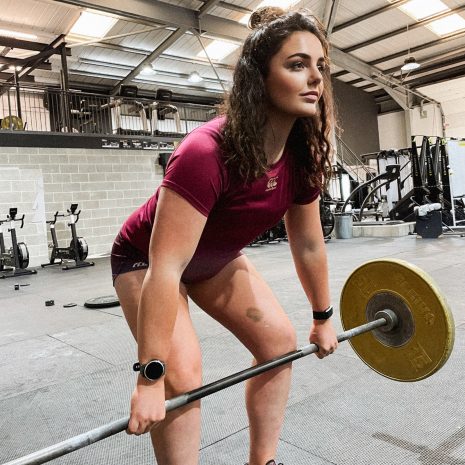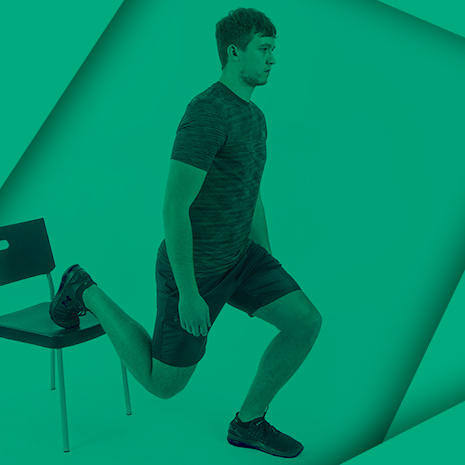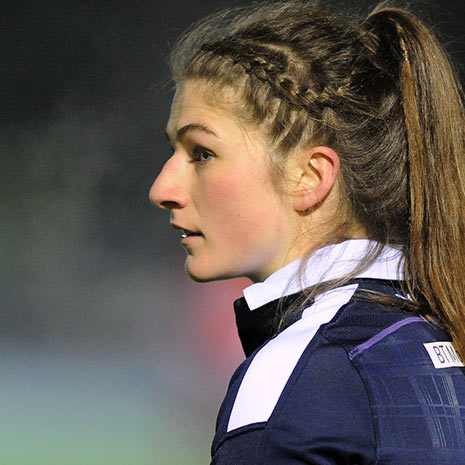Play to your Strengths.
rugbystore.co.uk recently caught up with Canterbury Ambassador, David Wallace (former British and Irish Lions, Ireland and Munster player), at the Canterbury Ultimate Training Day in London. We took the opportunity to ask him his advice for amateur rugby players looking to improve their game.
rugbystore: Is there any common mistakes you think that new players make when they start training seriously for rugby?
David Wallace: Yes, I think there are. At certain levels, when the guidance isn’t as good or isn’t there at all, I think players will train to be bodybuilders. For me, rugby was about being relatively strong up on top but really it was all about the lower half of my body and getting my legs strong, powerful and then focussing on being dynamic and agile. Those are the things that you need to be working on rather than just getting as big as you can, or having a big upper body and no legs because it’s all about the lower half.
RS: Is there any pre-game rituals that you have and is there a danger in having them?
DW: I think that rituals are brilliant for players. Certainly for me, I suppose it wasn’t so much rituals but routines. For me it was a little bit like having a plan, so before I went onto the pitch I knew that I had been through every stage of my routine. I knew that I had all the boxes ticked, so I wouldn’t be going out two minutes from kick-off going “ohh I forgot to do this”. Obviously, that can be distracting you when you go out and need to perform. You want to become clear and comfortable when you go out on the pitch, so having routines or rituals or whatever you want to call them for me, are a very good thing, anything that helps calm you.
Some guys can be quite nervous, I was always quite nervous so it helped me going from one thing to the next and being quite methodical about it. Other guys actually have pure rituals, like they will only wear a certain pair of shorts.
Donncha O’Callaghan was a demon for it you know, he would always have the same gear for a line out session before the morning of a match and we would always say to him, “Aw was it just at the top of your gear bag?”, and he’d say, “Yeah, yeah it just happened to be there“, so some guys do certainly do that.
RS: How should players deal with nerves a night or hour before the game?
DW: For me, certainly, I don’t think I suffered from nerves but I was nervous and it’s not a nice feeling to have that two hours before a game when you just want to run away and hide somewhere on a beach and just chill out. You’re facing the jaws of something that’s going to be a tired affair but I think once you get to a changing room, once you get to a pitch, you just relish it and you love it and that’s when nerves dissipate.
Always be looking for different angles and different ways to do things because a small change will have a big effect.
The night before games the things that used to help me relax were just watching a movie, or sometimes I’d even watch one the morning before a game if you got a later kick off. Anything that will help you escape or whatever, something that will put you in another place and certainly you can just switch off for that hour an half. That helps because you don’t really want to be wasting nervous energy, you want to be keeping all that for when you get out on the pitch.

RS: Recovery is an essential part of playing top rugby. Do you have any preferred method of recovery?
DW: I just love going into a pool and wallowing in it like a fat hippo or something. For me especially, since I had a bad back for about a year and half towards the end of my career. Getting to take the weight off was just heaven.
RS: The ice baths weren’t for you then?
DW: The ice baths had a place but I think that the hot and cold showers are just as good. The ice baths were an acquired taste, definitely. I think that just getting into a pool and letting your body relax, feeling all the tension in your back just drift away… hopefully.
RS: Sometimes players feel like they have hit a wall with their improvement. Is there anything you would advise to help get them through that?
DW: I suppose if you’re hitting a wall with your improvement you’ve got to be careful. I mean you are always chasing to be better in what you are doing and you’re never obviously the complete article. But if you find that you’re hitting a wall in certain things and your training and training but you see no improvement then that is slightly different.
Obviously your body will adapt to what you’re doing so you need to be changing and alternating what you’re doing, in the gym or wherever it is. Always be looking for different angles and different ways to do it because a small change will have a big effect.
That’s probably the one bit of advice that I’d give, just try changing things around. Your body will adapt and when it’s accustomed to something you need to keep pushing your body, get out that comfort zone and push it a bit further by doing things in different ways.If you try and be someone else out there it’s not going to work.
RS: What’s the best piece of advice that you’ve been given that you would pass onto amateur players?
DW: Goal setting is very important. Somebody sat me down when I was quite young and I’d probably had a couple years that had been a bit fallow for me, so they sat me down and did some goal setting. Just writing down some long and short term goals and grading myself in different aspects of my game, in a very honest way was something that was very useful for myself.
RS: How long term were you looking?
I was looking maybe a couple of years down the line, two or three years. I am so delighted that I did it and I got massive gains from it. I suppose it’s like having a contract with yourself and it’s something that’s quite private. It’s not to give to someone else like a teacher or a coach, you’re in control of it and it’s a promise to yourself. That can be in the back of your mind and then all the smaller stuff you can use to push yourself to get to those goals. Yeah that’s was quite beneficial I think when I was a young fella.

RS: Now an issue that comes up a lot at all levels of rugby is players being asked to play out of their preferred position. Do you have any advice for them?
DW: Yeah, I suppose I was lucky or unlucky as in my career I ended up at Number 8, Second Row, Winger, Centre and you know all parts of the back row. I think you have just got to back yourself and you have to play to your strengths no matter what position you’re in. Obviously you’re going to try and be positionally correct and things like that, but if you’re not comfortable doing certain things then do something that you think you might be good at.
Don’t try and be somebody else, don’t have a picture in you mind of a player that can do things that you can’t. Have a picture of yourself in that position and bring what you can to that position. If you try and be someone else out there it’s not going to work because you’re not going to have that skill set.
RS: What other sport and sport persons should rugby players in your positions watch for inspiration?
DW: I love watching American football, especially the running backs. There’s a lot to learn from their style of low centre of gravity, keeping close to the ground, pivoting, twisting and just getting through the tackles and finding a way. Being a little more north to south as they say, and trying to get that go forward ball, that’s something that I like to watch and I can admire.
RS: Is there an American Footballer you enjoy watching play the most?
I was watching Hard Knocks there earlier and a guy I was following during the season was Devonta Freeman and I think he has had an amazing season. He was particularly impressive and he was on Hard Knocks there a few years ago and he was a rookie at the time with the Atlanta Falcons. He was pretty impressive over the last season and blew the other guys out of the park.
I can also see a lot of things in basketball that can be good in terms handling skills. I look at someone like Brian O’Driscoll, you could see him on a basketball court doing little feints, little soft hands or whatever it is. Something like that is very beneficial to the game, I didn’t play much basketball myself but I can certainly appreciate it.
RS: Finally, any last advice for players looking to break into professional rugby?
DW: For me it would be to work on your weaknesses and to play to your strengths when you’re out there. When you’re away from the game you have got to the do the bits of individual training, extras as we used to call them, do them away from the group. It’s very easy to be a sheep and just go along with what everyone is doing, but you’re the best judge of your own body and your own capability so know what your deficient in and work on it. Then when you’re out on the pitch play to your strengths and play to what you’re good at.
Need more?
Check out our training section for more tips from players, trainers and nutritionists.
What would you like to know from The Professionals? Let us know in the comments and remember to share your own tips for other players.




Comments